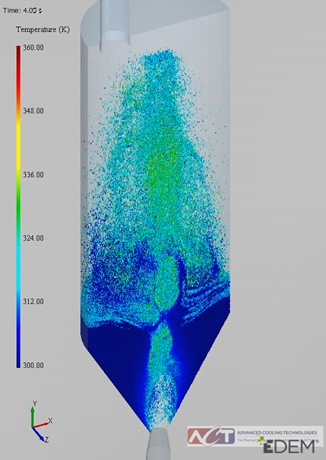Photo: Pilot-scale Spouted bed Reactor Fabricated by ACT, Installed at the ERC.
The Energy Research Center (ERC) is collaborating with Advanced Cooling Technologies, Inc. (ACT) on advancing development of an innovative thermal desorption concept for removal of harmful contaminants in bulk materials, like coal and contaminated soil. Project leads are Drs. Quang Truong and Srujan Rokkam from ACT, and Zheng Yao and Dr. Carlos Romero from the ERC. The project has been funded by the US Department of Energy (DOE) – Office of Fossil Energy, through its Small Business Innovation Research (SBIR) Program. The project has advanced through Phase I and II of the program (with funding of $1.15M), demonstrating the feasibility of the concept at a laboratory- and prototype-scale, with success. Recently, the team has been notified by DOE of further award for Phase II-B of the project, a $ 1.1M award for two years. The novel Spouted Bed design demonstrated, in testing at the ERC, an improvement in desorption efficiency 2x the efficiency of conventional reactors, and the capability for cost-effective removal of sulfur, mercury, arsenic and lead in the feedstock. Testing at temperatures up to 575ºF, with a range of coal ranks, demonstrated weight removal in excess of 60% for selected toxic elements. The Phase II-B project will consist in the development of a modular 500 lb/hr system capable of operating with air or supercritical CO2 for additional material drying, and fitted with a topping packed bed scrubber for filtering of contaminants and volatile organic compounds. Commercial applications of the SSB technology will be looked up in the Phase II-B project, including soil remediation sludge clean-up from the paper industry, and biowaste preprocessing.
According to Dr. Srujan Rokkam, R&D group leader at ACT, “This DOE project is uniquely pushing the frontiers of thermal desorption technologies, with a direct impact on coal beneficiation and soil decontamination. The ERC has been a great partner on these SBIR grants and their support has been instrumental to meet the milestones of the project.”

